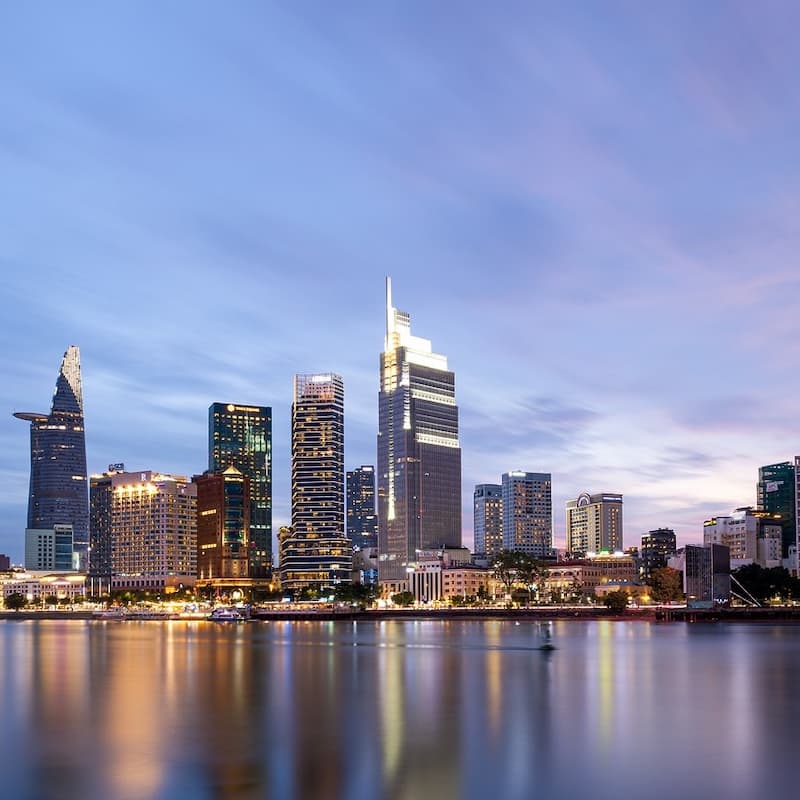Emerging Markets
Vietnam “Tiger Cub” Well Placed To Become "Asian Tiger" After Upgrade

Two wealth management houses reflect on an index provider’s decision to raise Vietnam’s stock market to “emerging market” status.
The Vietnamese economy has been promoted to the “emerging market”
from “frontier” status by index provider FTSE Russell, opening
the way for more investors to hold companies operating in the
Southeast Asian nation.
Formal inclusion of the country in the FTSE Russell emerging
market category took effect on 21 September, subject to
certain conditions being met.
“This milestone is the result of Vietnam’s decisive and
coordinated reforms, elevating the country’s standing on the
global investment map,” Minh Dang, Dragon Capital’s head of
research, said in a note yesterday. Dragon Capital has $5 billion
in AuM.
The country, still nominally a Communist state but having
embraced forms of capitalism in the past few decades, boasts a
relatively strong gross domestic product growth rate. GDP rose
7.85 per cent in the first nine months of this year, with a 8.23
per cent rise in the third quarter.
Julius Baer, the
Swiss private bank which has significant presence in Southeast
Asia, said: “This [Index move] should give Vietnam access to a
larger pool of capital and increase institutional investor
participation. We would not be chasing the news in the near term
as stocks have rallied 30 per cent year-to-date in anticipation,
implying limited upside.”
“We nevertheless maintain our positive view on the market as the
upgrade affirms that Vietnam has reached a key milestone in its
development. This should drive more reforms,” Julius Baer said in
a research note.
Earnings growth
Dragon
Capital – which this news service has interviewed before,
see here and
here – said it predicts corporate earnings growth in
Vietnam of 21 per cent in 2025 and a further 17 per cent in 2026.
Since the start of this year, the Vietnam Index has gained 30.3
per cent in dollar terms; average daily trading value has held
consistently above $2 billion.
Minh Dang said Vietnamese regulatory bodies have “worked
intensively” to deliver institutional and infrastructure reforms,
resulting in two decrees, four circulars, and one amended law to
strengthen the legal framework, align with international
standards, and prepare for this reclassification.
“While FTSE’s decision is a well-deserved recognition of these
efforts, we believe what is even more significant is that Vietnam
does not view this as the final destination. For the first time,
the government has laid out a comprehensive long-term strategy
with specific actions to target FTSE Advanced EM and MSCI EM
status by 2030,” Minh Dang continued. Government priorities
include reviewing foreign ownership rules to raise limits and
remove unnecessary sectoral restrictions; upgrading clearing and
settlement infrastructure to support non-pre-funded transactions
and introduce a Central Counterparty (CCP) model; gradually
allowing securities lending, controlled short selling, and
same-day trading; and developing the foreign exchange market
with hedging instruments to support foreign portfolio
investors.
Prospects
Although Vietnam accounts for 32 per cent of the FTSE Frontier
Index, the index only has a total market capitalisation of $156
billion. Even with a much-reduced weighting – estimated at 0.3
per cent to 0.5 per cent – in the FTSE Emerging Index, an upgrade
to a larger index would be positive in giving Vietnam access to a
much larger pool of capital as the Emerging Index with its total
market cap of $9.4 trillion is some 60x larger,” Julius Baer
said.
“This should lead to incremental inflows estimated at between
$1.5 billion to $6 billion based on the street’s initial
projections. Greater institutional participation should also
deepen liquidity for the market.
“As the local Vietnamese mainboard has already surged 30 per cent
year-to-date in anticipation of the upgrade, we would not be
chasing the rally in the short term. Indeed, the experience of
Iceland, Saudi Arabia, Kuwait and Qatar when they were upgraded
to FTSE Emerging Market status suggests that post-announcement
price action has been mixed with Saudi Arabia outperforming but
Qatar and Iceland lagging,” Julius Baer said.
“Among the five ‘tiger cub’ economies in Southeast Asia, Vietnam
has the best prospects of becoming an ‘Asian tiger’, given its
commitment to reform and emphasis on moving up the value chain to
grow expertise in high-tech sectors,” it added.
See this guest article from Bank Syz about Vietnam and its economic potential.